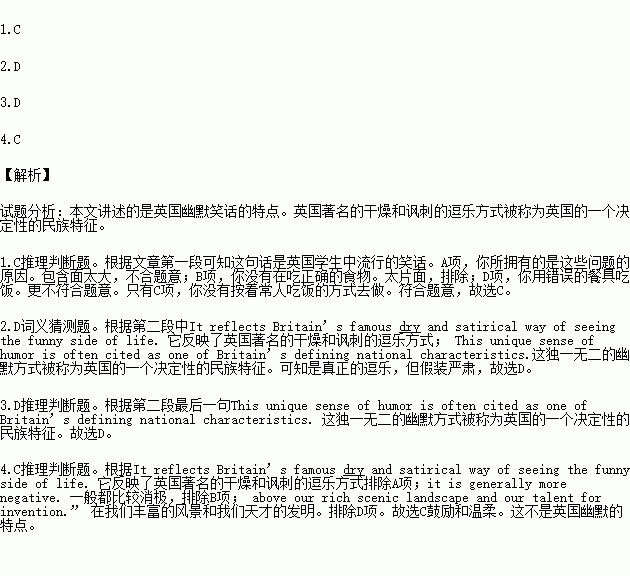ÌâÄ¿ÄÚÈÝ
A man walks into a doctor¡¯s office. He has a cucumber up his nose, a carrot in his left ear and a banana in his right ear. ¡°What¡¯s the matter with me?¡± he asks the doctor. The doctor replies, ¡°You¡¯re not eating properly.¡±
This is a popular joke among British schoolchildren. It reflects Britain¡¯s famous dry and satirical way of seeing the funny side of life. This unique sense of humor is often cited as one of Britain¡¯s defining national characteristics.
¡°The famous British sense of humor has long been our most cherished national characteristic,¡± says the British journalist Leo Mckinstry. ¡°We have valued it above historic military victories and great works of literature, above our rich scenic landscape and our talent for invention.¡±
The British sense of humor differs from other countries because it is generally more negative. When it comes to making the British laugh, there is nothing more effective than a socially inappropriate joke.
Popular British comedy shows such as Fawlty Towers, Blackadder and The office are full of sarcasm(·í´Ì), teasing and self-deprecation(×Ô³°). It reflects the culture where mocking, moaning and ridicule is part of everyday life.
While most Britons don¡¯t take these jokes too seriously, foreigners are often puzzled by them. A recent survey found that most foreigners who visited Britain found that the British are ¡°arrogant, unfriendly and have almost no sense of humor¡±.
Do foreigners not understand British humor or are the British just not as funny as they think they are? Mckinstry certainly thinks the British are funny. ¡°Accusing the British of having no sense of humor is like telling Rolls-Royce that its cars are down-market.¡± he says.
1.What does the doctor actually mean by the remark, ¡°You¡¯re not eating properly¡±?
A. What you have had is the cause of these problems.
B. You are not having the right food.
C. You don¡¯t eat the way people usually do.
D. You eat with the wrong cutlery(²Í¾ß)
2.The word ¡°dry¡± in Paragraph 2 means _________.
A. without water or liquid inside
B. special and popular among school children
C. dull and meaningless
D. pretending to be serious when really joking
3.Why do most visitors, who once visited Britain , think that the British are unfriendly?
A. Because the British always take things seriously.
B. Because the British have no sense of humor.
C. Because the British are cold and difficult to get along with
D. Because the British have a different sense of humor
4.Which of the following are NOT the characteristics of British humor?
A. Dry and satirical B. Negative and mocking
C. Encouraging and gentle D. Clever and witty

